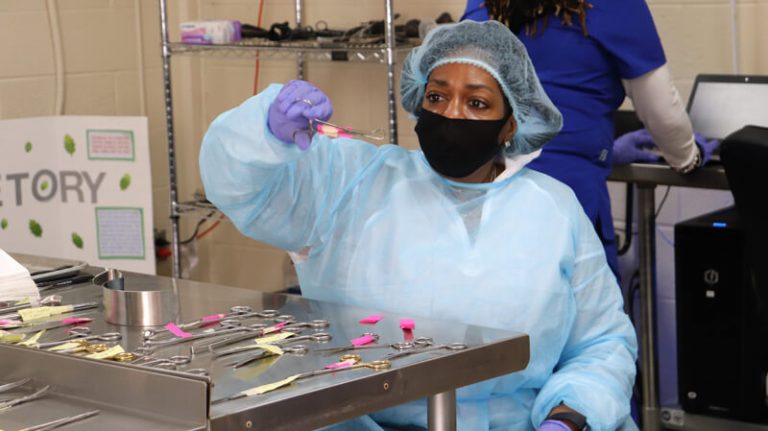Sterile processing constitutes the cleaning, disinfection, and sterilizing of medical instruments, devices, and equipment used in patient care. The need to maintain high infection control standards and the rising demand for healthcare services has contributed to the field’s meteoric rise. Understanding sterile processing‘s future and opportunities for professional progression is crucial.
central service technician constitutes the cleaning, disinfection, and sterilizing of medical instruments, devices, and equipment used in patient care. The need to maintain high infection control standards and the rising demand for healthcare services has contributed to the field’s meteoric rise. Understanding sterile processing‘s future and opportunities for professional progression is crucial.
The various trends are expected to shape the future of sterile process.
Automation And Technology
Automation and technology will impact central service technician. In addition, sterilization processes are being streamlined by developing new technologies, making them quicker and more efficient. Modern sterilization technologies and sterile equipment that utilize ozone or hydrogen peroxide gas are gaining popularity.
New sterilization technologies are being developed to help clean and inspect medical equipment. For instance, automated endoscope reprocessors are now more effective than manual techniques at cleaning and sanitizing endoscopes. As a result of these technical developments, sterile processing jobs will increase soon.
Emphasis On Infection Control
Another trend that shapes the future of sterile processing is infection control. COVID-19 has highlighted the need for infection control in healthcare. This trend is expected to grow in the coming years.
The various trends are expected to shape the future of central service technician.
Automation And Technology
Automation and technology will impact sterile processing services. In addition, sterilization processes are being streamlined by developing new technologies, making them quicker and more efficient. Modern sterilization technologies and sterile equipment that utilize ozone or hydrogen peroxide gas are gaining popularity.
New sterilization technologies are being developed to help clean and inspect medical equipment. For instance, automated endoscope reprocessors are now more effective than manual techniques at cleaning and sanitizing endoscopes. As a result of these technical developments, sterile processing jobs will increase soon.
Emphasis On Infection Control
Another trend that shapes the future of sterile processing is infection control. COVID-19 has highlighted the need for infection control in healthcare. This trend is expected to grow in the coming years.
As healthcare institutions focus on infection control, the demand for professional sterile processing technicians trained in correctly cleaning and sterilizing medical equipment will increase.
Increasing Demand For Healthcare Services
The demand for healthcare services will continue to increase, driven by an aging population and a rise in diseases. This increased demand for healthcare services will create a greater need for medical equipment and skilled sterile processing technicians who can properly clean and sterilize that equipment. The need for central service technician services will only increase.
Greater Recognition Of The Importance Of central service technician
Finally, there is a growing recognition of central sterile technician in healthcare. As the role of sterile processors becomes more critical in the fight against COVID-19 and other infectious diseases, there is a greater appreciation for their work.
This recognition will likely lead to increased investment in central sterile processing technician, including higher financing for training programs and new technology, and expanded employment possibilities in this industry.
Career Growth Opportunities
As the need for healthcare services and sterile processor grows, this profession will provide various prospects for advancement. Individuals can consider the following positions and roles:
Sterile Processing Technician
In the entry-level position, central service technician are responsible for cleaning, sterilizing, and assembling surgical equipment.
Sterile Processing Manager
The central service technician manager ensures all instruments and equipment are prepped and appropriately processed. In addition, sterile techs are in charge of overseeing the inventory, equipment, and personnel.
Infection Control Specialist
Infection control specialists ensure that all hospital procedures and sterile equipment meet the highest infection prevention standards.
Clinical Educator
A clinical educator oversees sterile techs’ training and education to ensure they have the skills and knowledge to carry out their duties successfully.
Quality Assurance Coordinator
A quality assurance coordinator monitors the quality of sterile processing services, ensuring that all processes meet regulatory requirements.
Conclusion
Finally, with continuous expansion in the healthcare business, the future of sterile processing services is bright. As the need for healthcare services and sterile processing grows, this profession will provide various prospects for advancement. Individuals who want to work in sterile processing should have the relevant education and training to gain the essential skills and expertise.
You may also like
-
Join The IATA-Certified Airline & Cabin Crew Training – Neerja School of Aviation
-
How to Become an Angel Investor: Easy Guide for Beginners
-
Which Institute Offers the Best Google Ads Course in Karachi?
-
Easy Tips for CBSE Sample Paper 2025-26 Practice
-
Top Mistakes to Avoid When Writing a Book Report in 2025

